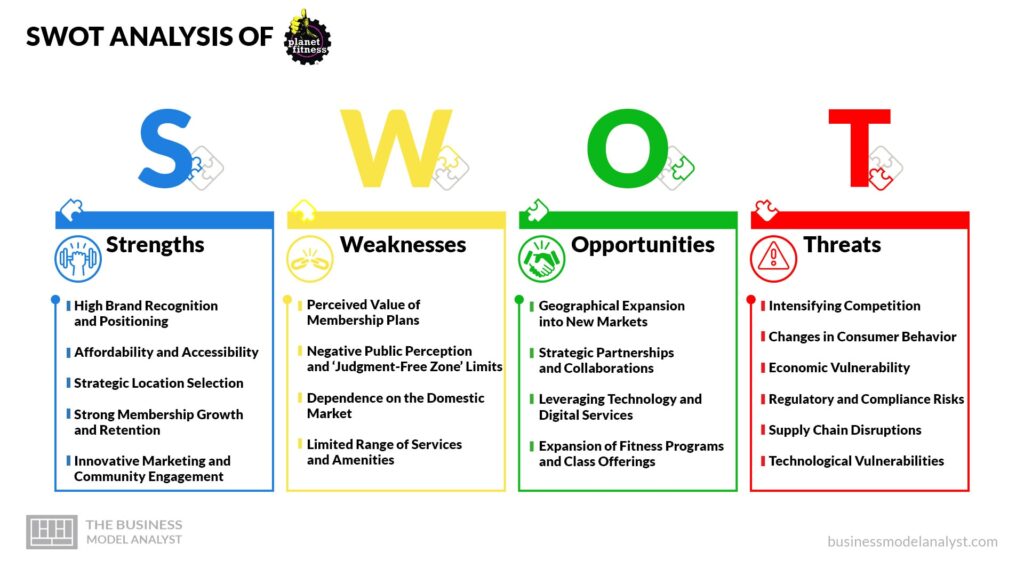The Planet Fitness SWOT analysis is vital for understanding the dynamics of one of the largest and fastest-growing fitness franchises in the United States. Known for its affordable membership options and non-intimidating atmosphere, Planet Fitness has carved out a unique niche in the crowded fitness industry, bringing the concept of a “Judgment-Free Zone” to life.
Since its foundation in 1992, the company has significantly expanded its footprint, boasting thousands of locations nationwide and a solid membership base that continues to grow. However, like any business, Planet Fitness faces various challenges and opportunities that could influence its trajectory.
This SWOT analysis will analyze the strengths that bolster Planet Fitness’s market position, the weaknesses that pose risks, the opportunities for growth, and the threats that could disrupt its success. By examining these critical factors, stakeholders, including investors and competitors, can gain valuable insights into what makes Planet Fitness a formidable player in the fitness landscape.
Planet Fitness Strengths
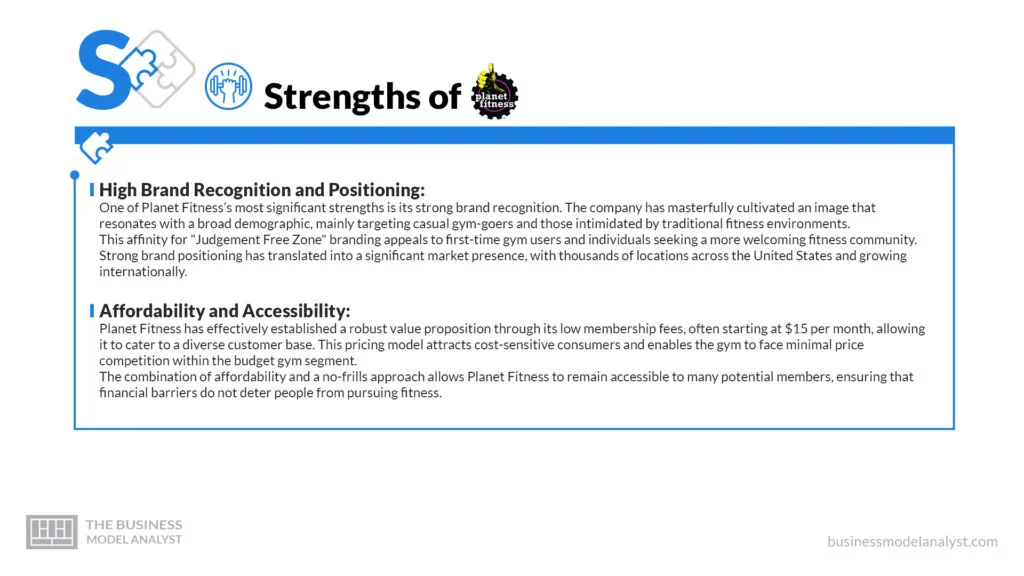

Several key strengths distinguish the company in the competitive fitness industry landscape. These advantages position Planet Fitness as a notable player and a dominant force in the gym and fitness center sector.
High Brand Recognition and Positioning
One of Planet Fitness’s most significant strengths is its strong brand recognition. The company has masterfully cultivated an image that resonates with a broad demographic, mainly targeting casual gym-goers and those intimidated by traditional fitness environments.
This affinity for “Judgement Free Zone” branding appeals to first-time gym users and individuals seeking a more welcoming fitness community. Strong brand positioning has translated into a significant market presence, with thousands of locations across the United States and growing internationally.
Affordability and Accessibility
Planet Fitness has effectively established a robust value proposition through its low membership fees, often starting at $15 per month, allowing it to cater to a diverse customer base. This pricing model attracts cost-sensitive consumers and enables the gym to face minimal price competition within the budget gym segment.
The combination of affordability and a no-frills approach allows Planet Fitness to remain accessible to many potential members, ensuring that financial barriers do not deter people from pursuing fitness.
Strategic Location Selection
The company has implemented a strategic approach to site selection, which is crucial in the fitness industry. Planet Fitness actively seeks locations in densely populated areas with high visibility and easy accessibility, such as shopping centers and urban areas.
This strategic positioning enables the brand to maximize foot traffic and visibility, making it easy for potential members to integrate fitness into their daily routines. As a result, many clubs are conveniently located to be accessible to current and prospective members.
Strong Membership Growth and Retention
Planet Fitness enjoys a consistent and increasing membership base, a testament to its successful business model. With over 18 million members and counting, the company has demonstrated effective membership growth and retention strategies through engaging marketing campaigns and community-oriented initiatives.
In addition, flexible membership options enhance customer satisfaction and loyalty. The low-commitment nature of their memberships encourages individuals to join without the fear of long-term obligations, promoting higher retention rates.
Innovative Marketing and Community Engagement
Innovation in marketing plays a critical role in Planet Fitness’s strategy. The company frequently employs unique and attention-grabbing advertisements that emphasize its no-judgment philosophy.
Campaigns highlighting quirky humor and relatable scenarios resonate well with their target audience, further cementing brand loyalty. Beyond traditional advertising, Planet Fitness actively engages in community outreach and charitable initiatives, creating a strong local presence that fosters connections with members and potential customers.
Diverse Range of Equipment and Facilities
Planet Fitness offers an impressive range of gym equipment and amenities that meet its members’ everyday needs. The facilities generally have state-of-the-art cardio machines, strength-training equipment, and various training zones, such as dedicated stretching areas and group fitness rooms.
This extensive array of equipment promotes an inclusive workout environment appealing to users of all fitness levels, ensuring that members feel accommodated regardless of their specific exercise regimens.
Commitment to Operational Efficiency and Scalability
Planet Fitness’s operational model is designed for scale and efficiency. With a franchise-focused approach, the company can maintain a uniform experience across its locations while allowing for rapid expansion with relatively low overhead costs.
Every franchisee benefits from a robust support system that includes brand training, marketing resources, and operational guidance. Planet Fitness’s commitment to operational efficacy and continued investment in technology to enhance the member experience position It well for further growth.
Strong Digital Presence and Membership Management
In today’s digitized world, Planet Fitness has invested in establishing a solid digital presence, including a user-friendly mobile app that enhances member experience. The app enables members to manage their accounts seamlessly, access workout resources, and engage with community events.
This digital engagement fosters member retention and provides a more sophisticated service experience. Enhanced technology usage helps streamline operations and tailored marketing, allowing for better customer insights and targeted initiatives.
Growing Franchise Network
The company’s franchise model has allowed for a rapid, expansive footprint across the United States and beyond. With over 2,600 operational locations and plans for more, this franchise-driven growth model supports local entrepreneurs, promotes economic involvement, and increases brand visibility. This growth strategy drives revenue through franchise fees and royalties and enhances brand presence to capture market share effectively.
Community-Centric Philosophy
Planet Fitness’s community-centric philosophy emphasizes inclusivity and support, which is particularly attractive in the health and fitness industry. Promoting a non-intimidating atmosphere encourages individuals from all backgrounds, fitness levels, and demographics to pursue their fitness journeys. This commitment to fostering a supportive environment is integral in reducing barriers for new gym users, encouraging them to actively engage in their health and well-being.
Planet Fitness Weaknesses
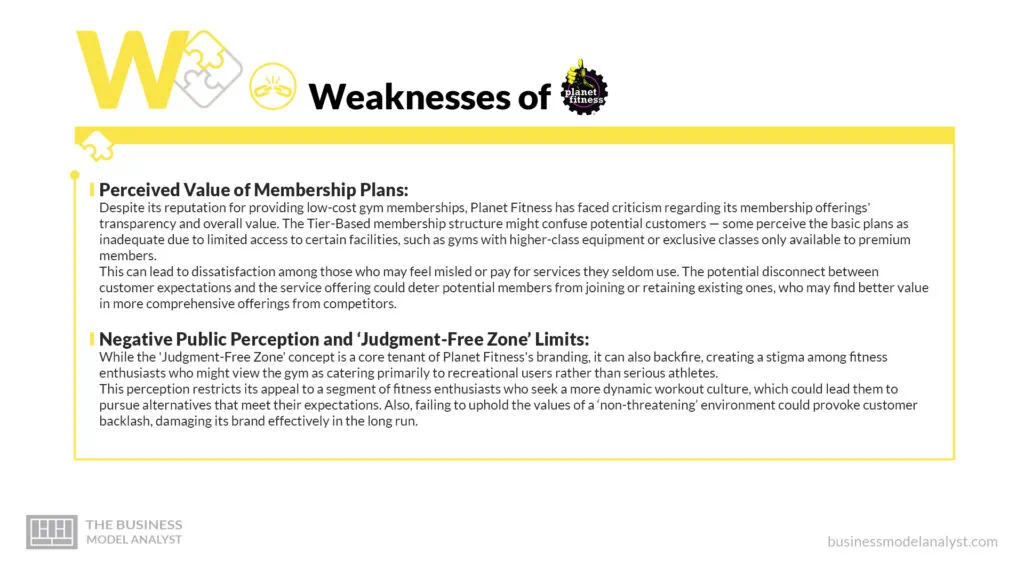

An analysis of Planet Fitness’ operations reveals several shortcomings that could hinder its long-term growth and profitability prospects. Below are key weaknesses that Planet Fitness should address:
Perceived Value of Membership Plans
Despite its reputation for providing low-cost gym memberships, Planet Fitness has faced criticism regarding its membership offerings’ transparency and overall value. The Tier-Based membership structure might confuse potential customers — some perceive the basic plans as inadequate due to limited access to certain facilities, such as gyms with higher-class equipment or exclusive classes only available to premium members.
This can lead to dissatisfaction among those who may feel misled or pay for services they seldom use. The potential disconnect between customer expectations and the service offering could deter potential members from joining or retaining existing ones, who may find better value in more comprehensive offerings from competitors.
Negative Public Perception and ‘Judgment-Free Zone’ Limits
While the ‘Judgment-Free Zone’ concept is a core tenant of Planet Fitness’s branding, it can also backfire, creating a stigma among fitness enthusiasts who might view the gym as catering primarily to recreational users rather than serious athletes.
This perception restricts its appeal to a segment of fitness enthusiasts who seek a more dynamic workout culture, which could lead them to pursue alternatives that meet their expectations. Also, failing to uphold the values of a ‘non-threatening’ environment could provoke customer backlash, damaging its brand effectively in the long run.
Dependence on the Domestic Market
Planet Fitness has enjoyed considerable success in the United States, but this reliance on the domestic market poses a risk. The company’s growth opportunities abroad appear limited compared to competitors willing to venture into international markets.
Planet Fitness risks missing out on significant revenue streams with varying fitness trends and consumer preferences worldwide. As international competitors emerge and exploit opportunities in foreign markets, Planet Fitness might be left vulnerable to declining membership rates within the U.S. should domestic trends shift unfavorably.
Limited Range of Services and Amenities
Planet Fitness offers a narrower array of services and offerings than its competitors. While its primary focus on essential gym services appeals to casual users, serious fitness enthusiasts might seek additional amenities such as personal training or sophisticated fitness equipment that Planet Fitness either lacks or offers at extra costs.
This limitation could deter health-conscious individuals seeking a more well-rounded fitness experience, mainly if competing gyms provide personalized training opportunities or unique group classes tailored to specific goals.
High Attrition Rates
Planet Fitness has recorded high member attrition rates, a significant weakness. While initially attracting numerous new members, the low-cost membership model may also lead to a behavioral pattern where members join but engage less consistently, ultimately canceling.
The nature of monthly billing contributes to this issue, as customers might maintain memberships without frequent usage merely due to a low monthly fee. Yet, when they feel disengaged, they cancel their memberships (which Planet Fitness has reportedly made difficult). This cycle inevitably impacts revenue and requires Planet Fitness to intensify its retention strategies to enhance member engagement.
Limited Brand Differentiation
While positioned uniquely within the fitness industry, Planet Fitness’s branding and service model bears similarities to several budget gyms. Providing a low-cost, no-frills workout environment only differentiates it to a certain extent.
Competitors such as Anytime Fitness and Crunch Fitness are also adopting similar pricing strategies, which diminishes Planet Fitness’s competitive advantage. In a crowded market where many budget gyms cater to cost-sensitive consumers, preemptive action to innovate beyond the current offerings is critical to avoid stagnation.
Operational Challenges in Scaling
As Planet Fitness expands, it faces operational challenges associated with opening new locations and managing a more extensive network of facilities. Maintaining consistent service quality across diverse locations can become cumbersome as the franchise model expands.
Inadequate training or oversight can lead to variances in customer experience and dissatisfaction among members, potentially damaging the Planet Fitness brand reputation. Ensuring operational efficiency and consistent standards will be crucial to franchise success, particularly in diverse local markets with differing demographic needs.
Planet Fitness Opportunities
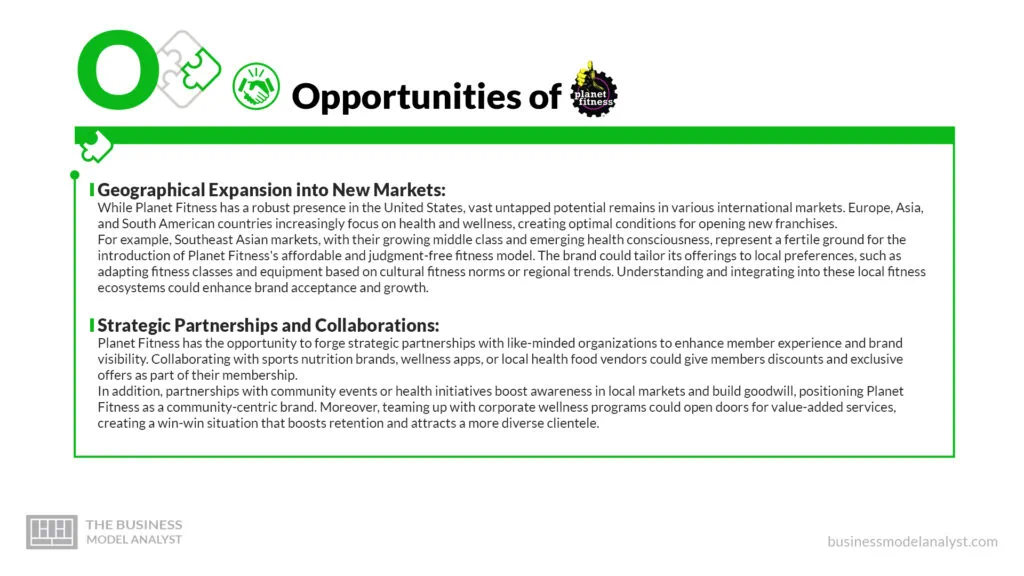

Planet Fitness holds numerous opportunities for expansion and enhancement that could solidify its position in the fitness industry and drive long-term growth. Below are some critical avenues through which Planet Fitness can capitalize:
Geographical Expansion into New Markets
While Planet Fitness has a robust presence in the United States, vast untapped potential remains in various international markets. Europe, Asia, and South American countries increasingly focus on health and wellness, creating optimal conditions for opening new franchises.
For example, Southeast Asian markets, with their growing middle class and emerging health consciousness, represent a fertile ground for the introduction of Planet Fitness’s affordable and judgment-free fitness model. The brand could tailor its offerings to local preferences, such as adapting fitness classes and equipment based on cultural fitness norms or regional trends. Understanding and integrating into these local fitness ecosystems could enhance brand acceptance and growth.
Strategic Partnerships and Collaborations
Planet Fitness has the opportunity to forge strategic partnerships with like-minded organizations to enhance member experience and brand visibility. Collaborating with sports nutrition brands, wellness apps, or local health food vendors could give members discounts and exclusive offers as part of their membership.
In addition, partnerships with community events or health initiatives boost awareness in local markets and build goodwill, positioning Planet Fitness as a community-centric brand. Moreover, teaming up with corporate wellness programs could open doors for value-added services, creating a win-win situation that boosts retention and attracts a more diverse clientele.
Leveraging Technology and Digital Services
The rise of digital fitness is transforming the way people approach exercise. Planet Fitness should further invest in enhancing its mobile app and digital services. The app could incorporate personalized meal plans and integration with wearables for a wholly tailored fitness experience.
Enhanced technology offerings, like virtual personal training sessions and chat support within the app, can foster community and support for members wherever they engage in their fitness routines.
Expansion of Fitness Programs and Class Offerings
Planet Fitness can diversify its class offerings to appeal to a broader demographic. For instance, incorporating more specialized fitness classes, such as senior fitness programs, can reach different age groups or fitness levels.
Expanding partnerships with certified personal trainers for these classes can also bolster the program’s credibility and appeal. By creating an array of options that cater to all demographics — from millennials to senior citizens — Planet Fitness can enhance overall membership appeal and retention rates.
Enhancing the Member Experience through Loyalty Programs
Developing an advanced loyalty program that rewards existing members for referrals or engagement can cultivate long-term customer relationships. Such initiatives could align with healthy lifestyle choices, rewarding members for attending workout classes or participating in challenges.
This program could also include partnerships with local health and wellness businesses, granting discounts or perks tied to healthier lifestyle choices. A strong loyalty program will help retain members and create brand ambassadors who will promote Planet Fitness to new users.
Health and Nutrition Offerings
As more consumers link fitness to overall well-being, integrating health and nutrition offerings alongside gym services could set Planet Fitness apart in a crowded marketplace. Implementing nutritional counseling and wellness coaching services within Planet Fitness locations could provide a comprehensive approach to health, making it a one-stop shop for fitness and nutrition.
Partnering with dietitians or nutritionists to offer workshops or resources as add-on services could also create additional revenue streams and enhance the brand’s image as a holistic fitness provider.
Focus on Sustainability and Eco-Friendly Practices
With increasing concern over climate change and environmental impact, Planet Fitness has an opportunity to position itself as an eco-friendly fitness brand. Implementing sustainable practices within its facilities — like energy-efficient equipment, eco-friendly building materials, and waste reduction programs — could appeal to environmentally conscious members.
In addition, communicating these initiatives through marketing can improve brand loyalty and attract a demographic that values sustainability. Engaging with the local community on environmental initiatives can strengthen Planet Fitness’s reputation as a socially responsible organization.
Planet Fitness Threats
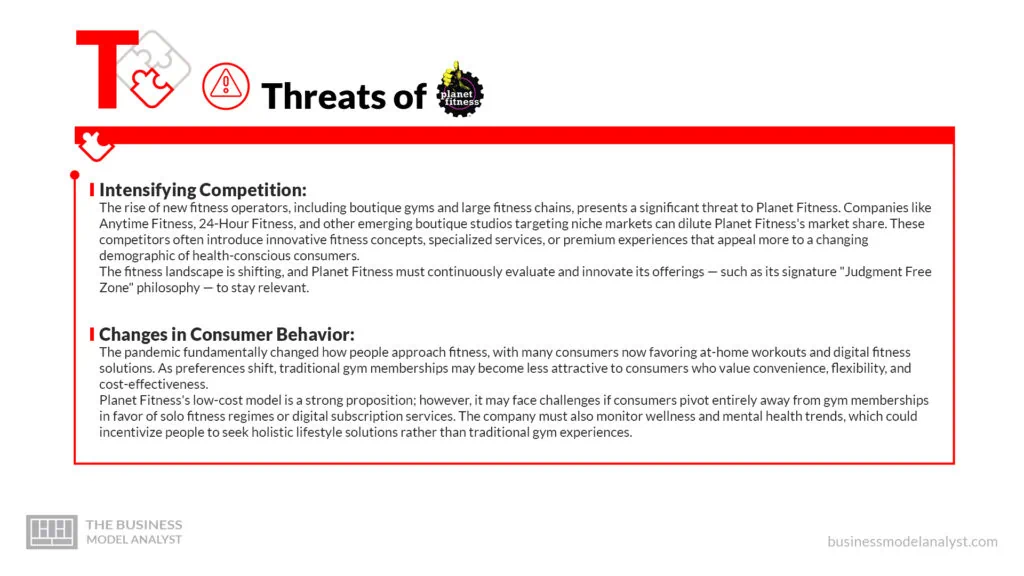

As a leader in the fitness industry, Planet Fitness faces numerous threats that could impact its growth and market positioning. The following are various challenges that could hinder its success and how the company can navigate these turbulent waters effectively.
Intensifying Competition
The rise of new fitness operators, including boutique gyms and large fitness chains, presents a significant threat to Planet Fitness. Companies like Anytime Fitness, 24-Hour Fitness, and other emerging boutique studios targeting niche markets can dilute Planet Fitness’s market share. These competitors often introduce innovative fitness concepts, specialized services, or premium experiences that appeal more to a changing demographic of health-conscious consumers.
The fitness landscape is shifting, and Planet Fitness must continuously evaluate and innovate its offerings — such as its signature “Judgment Free Zone” philosophy — to stay relevant.
Changes in Consumer Behavior
The pandemic fundamentally changed how people approach fitness, with many consumers now favoring at-home workouts and digital fitness solutions. As preferences shift, traditional gym memberships may become less attractive to consumers who value convenience, flexibility, and cost-effectiveness.
Planet Fitness’s low-cost model is a strong proposition; however, it may face challenges if consumers pivot entirely away from gym memberships in favor of solo fitness regimes or digital subscription services. The company must also monitor wellness and mental health trends, which could incentivize people to seek holistic lifestyle solutions rather than traditional gym experiences.
Economic Vulnerability
Planet Fitness’s business model is ripe for vulnerability during economic downturns. As a low-cost gym option, it primarily targets budget-minded consumers who may cut discretionary spending during tough economic times. Financial uncertainty can lead to reduced discretionary income, pushing customers to drop gym memberships in favor of home-based fitness solutions or free outdoor activities.
The implications of a recession could have an immediate negative impact on membership growth, retention, and overall revenue. Rising inflation may pose challenges like increased operational costs — rent, utilities, and equipment — which can eat into profits unless adequately managed.
Regulatory and Compliance Risks
Operating in the fitness industry subjects Planet Fitness to various regulatory and compliance obligations such as health, safety, and labor laws. Any lapses in compliance can result in fines, reputational harm, and even potential litigation.
Planet Fitness must remain agile in its compliance efforts as regulations evolve regarding health and safety standards — from sanitation protocols to occupancy levels. Failure to adapt to new regulations can hurt its brand image and lead to costly legal battles, undermining the trust and loyalty of its member base.
Supply Chain Disruptions
The fitness equipment supply chain has encountered challenges that could impact Planet Fitness’s ability to offer new and innovative fitness solutions. The global pandemic exposed vulnerabilities in supply chains, leading to delays and shortages in fitness equipment.
These disruptions slow franchise owners’ capacity to furnish new gyms or upgrade existing locations, leading to lost revenue opportunities and customer dissatisfaction. In addition, ongoing uncertainties emanating from geopolitical tensions may further complicate the sourcing and acquisition of new exercise machines, impacting the brand’s expansion plans and operational efficiency.
Technological Vulnerabilities
As Planet Fitness leans more into technology — whether through mobile app integrations, virtual classes, or advanced gym equipment — it faces the looming risk of technological failures. System outages failed app updates, and cyber threats pose risks not just to operations but also to the data security of its members.
A significant data breach could lead to loss of customer trust, reputational harm, and potential legal ramifications. Therefore, investing in robust cybersecurity measures and maintaining high standards for data privacy is crucial for the company’s ongoing stability and consumer trust.
Labor Market Challenges
The fitness industry relies heavily on human capital for operations. Planet Fitness is not immune to ongoing labor market challenges characterized by high turnover, employee dissatisfaction, and recruitment difficulties. In a tight labor market, retaining qualified staff to provide a welcoming and supportive environment becomes paramount for member satisfaction.
In addition, low wages compared to rising living costs might disincentivize quality candidates from seeking positions at the company. Managing this threat could necessitate reevaluating employee compensation, benefits, and workplace culture to ensure a stable, skilled workforce.
Negative Customer Experiences and Social Media Impact
In an age of social media, customer feedback can rapidly influence brand perception. Planet Fitness must be vigilant about providing excellent customer experiences because negative reviews can spread like wildfire online. A misstep — whether due to cleanliness, equipment malfunctions, or customer service failures — can overshadow the brand’s positive attributes.
In today’s hyper-connected environment, where platforms like online review sites and social media can amplify negative feedback, a proactive approach to customer service and crisis management is vital. Planet Fitness should be prepared with a comprehensive strategy for addressing concerns and swiftly transforming negative experiences into positive ones.
Conclusion
Planet Fitness’s SWOT analysis reveals a well-rounded company poised for continued growth in the competitive fitness industry. Its strengths, such as a strong brand identity and an affordable membership model, position it favorably against competitors. However, it must address potential weaknesses like operational challenges in scaling and reliance on the U.S. market.
The opportunities presented by a growing health-conscious consumer base and potential international expansion further bolster its outlook. Nevertheless, threats like increasing competition and economic downturns could pose challenges. By strategically leveraging its strengths and opportunities while addressing weaknesses and threats, Planet Fitness can continue to thrive and expand its market presence in the evolving fitness landscape.


